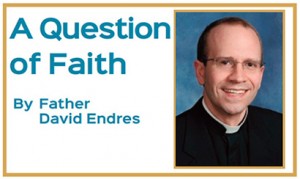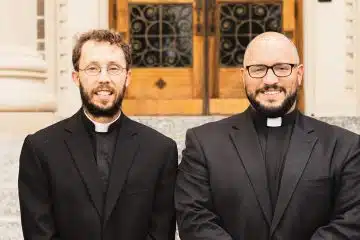A Question of Faith: Fr. Endres discusses Baptism
 My son has two children, ages two and four. He does not seem interested in having them baptized. Can I baptize them myself?
My son has two children, ages two and four. He does not seem interested in having them baptized. Can I baptize them myself?
As the number of Americans who no longer identify with any religion increases, frequently the children of baptized Catholics go without the sacrament of baptism. Many dioceses have seen the number of infant baptisms decline significantly in the last ten years. Yet the necessity of baptism remains. The Catechism explains, “The Lord himself affirms that baptism is necessary for salvation (John 3:5) . . . . Baptism is necessary for salvation for those to whom the Gospel has been proclaimed and who have had the possibility of asking for this sacrament” (Catechism of the Catholic Church, 1257). Further, the law of the Church places an obligation on parents to see that their children are baptized as soon as possible: “in the first weeks” after birth (canon 867).
The family members of non-baptized children who value the faith and recognize the importance of baptism rightly question whether baptism can be performed even without the consent of the parents. Despite the good motives of one wishing to baptize, the law of the Church holds that without the consent of at least one parent or guardian, the children should not be baptized.
Baptism can be validly performed by anyone, including lay Catholics and even non-Catholics, provided that they have the intention to baptize, pour over or immerse the person in water, and use the Trinitarian formula: “I baptize you in the name of the Father, and the Son, and the Holy Spirit.” Yet this does not mean that anyone who can baptize should.
Clergy by virtue of their ordinations are set apart for sacramental service. The laity are to baptize only in exceptional situation such as danger of death. Baptisms (whether by clergy or laity) ordinarily take place with the consent of at least one parent (canon 868 § 1). If consent from a parent is lacking, as in the case of grandparent or other family member baptizing, the baptism may be valid (when the proper formula was used), but in violation of the law.
When baptizing an infant, there must be a well-founded hope that the infant will be brought up in the Catholic religion. In the case of a grandparent or other family member other than the guardian consenting to baptism, the child’s future religious training and sacramental preparation might not be as easily assured. The Church recognizes the preeminent role of parents as a child’s first teachers in the faith. Even if canon law obliges parents to see to the baptism of their children, the Church respects the role of parents and their freedom to raise their children in the faith or without faith. While it is laudable for grandparents and other family members to help supply for a child’s religious education and practice of the faith, this does not outweigh the wishes of the parents.
While a grandparent should not baptize outside of an emergency or exceptional situation, they can encourage their children to provide for the baptism of their own children. The family member’s example of love and faith can be an example to their family. Their example plus a gentle invitation to the child’s parents to seek baptism for their children can begin the conversation leading to baptism and fuller participation in the sacramental life of the Church.












